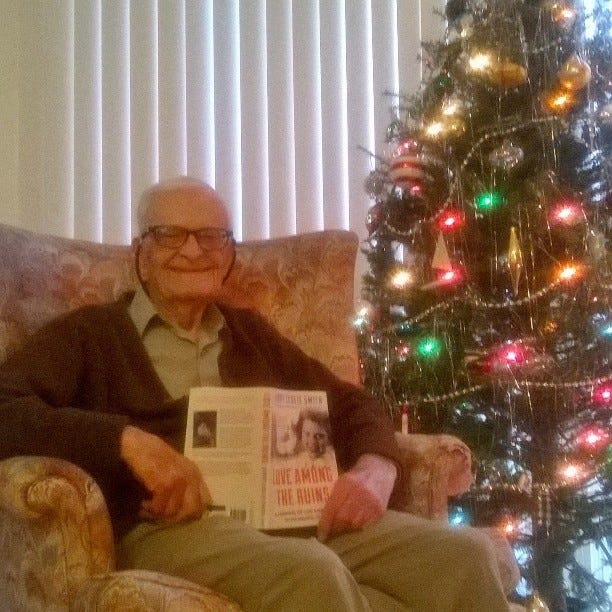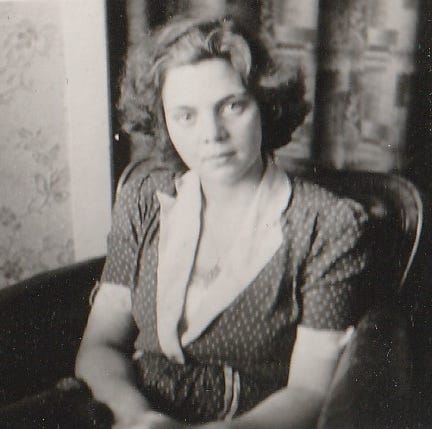My dad Harry Leslie Smith's remembrance of life in post-war Germany is a unique record of that point in Germany's history. No other working-class soldier serving in the occupation forces provides such a detailed description of life in the city of Hamburg, or the psychology of Germans trying to scrape a life together in a metropolis turned into Gomorrah by the wrath of the RAF and USAF.
It is also an extraordinary record of how a working-class man charged with the task of being an occupation soldier experiences daily life in a foreign nation. The final part of my father's reflection on Christmas in Germany during the first few months of peace is a beautiful, optimistic portrait of young love. There is a belief that from the rubble of that terrible war, so much could be snatched to rebuild a better world if you dared to be different. Below is Part three and the first two parts are available on my substack as well.
When dinner was called, the Gellerson’s brought a gramophone out and set it up in the kitchen. Over dinner, we listened to ancient pre-war 78rpm discs of German carols or nostalgic songs about Hamburg sung by soloists. During the meal, there was an element of make-believe in our conversation and in the expression and gestures of the diners. Between mouthfuls of soup and warm bread, my hosts remembered and relived old Christmases when there was no war and their life was not dictated by occupation. Maria Edelmann, the Gellersons and Friede laughed at old worn jokes. They spoke about people now missing from their lives but who at one time had passed over their hearts and left a shadow.
Friede turned to me and smiled as if to say, ‘All these old people and their memories; I will make a thousand better ones.’ Watching them, I understood that I was an outsider looking into their world. It was a universe of memories from a collapsed galaxy. It was odd that even though their lives had been so horribly altered by the war and their present filled with hunger and pessimism, they were still thankful for being alive.
Their stories about better days grew as thin as the candles burning on the tree and a melancholy fell across the room as the evening dwindled down towards midnight. Friede and her mother looked as soft and sad as English rain. Their hearts ached for a finished era, dead family, friends and lovers.
‘Harry, fill up everyone’s wine glass,’ Friede instructed and stood to toast Christmas Eve. ‘To life, to being alive, and to all of us being fed, healthy, and happy,’ she proclaimed.
Everyone clapped and drank. I noticed Maria Edelmann drained the entire contents of her glass and quickly refilled it with a trembling hand.
Maria then asked me, ‘So does your own mother make such a feast on Christmas Eve?’
I lied and said, ‘On Christmas Day, my Mam puts out a roast goose with all the trimmings,’ whereupon everyone enviously applauded my fictitious family festivities.
‘Look at the time,’ Herr Gellerson said, consulting his pocket watch. ‘It is almost midnight; we should exchange gifts.’
Another bottle of wine was opened while Friede handed out presents from under the tree. From Maria Edelmann, I received a small book of Schiller’s poetry and the Gellersons presented me with a pair of socks. When Friede opened up my gift, her eyes became as effervescent as champagne bubbles.
‘What is it?’ her mother asked.
‘It is so wonderful,’ Friede said. ‘Everyone come here and have a look at it.’
She held up an exquisite silver bracelet on which each link in the chain was a tiny silver elephant. Friede clapped her hands and said, ‘This is fantastic,’ as she placed it on her wrist for everyone to admire. Friede then handed me an envelope and said nervously, ‘I hope this is all right, I hope you understand.’
Inside the envelope was a large photo of Friede. The portrait showed her wearing the necklace I had bought for her birthday. My hands shook as I absorbed the photo and everyone around me faded away from consciousness.
Friede smiled invitingly from the photo and I swam in the depth of her eyes. They shone out from the picture and radiated a singular love for me. On the back of the photograph was inscribed: ‘Für Meine Harry, Ich Liebe Dich.’
‘Do you like it?’ she asked apprehensively.
I was silent and she repeated the question and woke me from my dreams. ‘Yes,’ I responded quietly.
‘It was very difficult for me to find a photographer, let alone someone with developing fluid and paper to make the portrait. There is literally nothing left in Hamburg to make photos.’
I leaned over to kiss her and said thank you a thousand times. I was overwhelmed and excused myself and went to get some air on the balcony. In the cold quarter-to-midnight air, I lit a cigarette and felt the wind dry my face stained with tears.
Friede came out onto the balcony and asked if I was OK. ‘Yes,’ I replied. ‘Your present was beautiful,’ I told her in a breaking voice.
‘What is it, then? Why are you so sad?’ she said.
‘Not sad, it’s just, before this, no one ever gave me a gift like yours. It’s hard to explain but I don’t think anyone has ever said they love me as you did in the photo.’
‘No one?’ she asked in disbelief.
‘Not a one,’ I said. ‘Neither my father nor mother ever really said they loved me. There was only my sister Mary who said she loved me before you. She’d say it when we went to bed as children, hungry and dirty from scrounging coal to try to keep our house warm.’
Friede, with wide open and caring eyes, kissed my hand and said, ‘Well, I love you. Our past lives are history. Let’s just try to love each other and hope it will survive the winter and the occupation.’
Maria Edelmann and the Gellersons came out onto the balcony. They held lit candles to confront winter’s darkness. With one arm around Friede and my other hand holding on to a burning taper, I heard the bells across the city strike midnight. As the bells rang, people from neighbouring apartments stepped onto their balconies, also holding lit candles. Eventually, the clamour from the bells drifted away and all that remained was an expectant emptiness in the air. A male voice stirred from four apartments away. He began in a low, strong tone, singing the words to ‘Silent Night’. His voice was joined by other singers until the melody reached our balcony; we also sang Brahms’ lullaby to mankind. The tune travelled deep into the blackened city and dissipated into the Elbe River, where it drifted out to the cold, dark Baltic Sea.
Thank you for reading my subtack and the chapter selection above from Harry Leslie Smith’s Love Among the Ruins. Your help is needed because the cost of living crisis has become a merciless grind. During these past 24 months, I am looking for 20 more paid subscribers this month to ease the path ahead b/c it’s rough.
I have posted 245 essays, as well as excerpts from the unpublished works of Harry Leslie Smith - along with chapter samples from my book about him. My newsletter has grown from a handful of subscribers to 1200 in that period. Around 10% of you are paid members. I appreciate all of you but ask if you can switch to a paid subscription because your help is NEEDED to keep me housed and Harry Leslie Smith's legacy relevant. But if you can't all is good too because we are sharing the same boat. Take care, John. Happy Christmas, Happy Holidays.





Thank you for the bitter sweet memories of a man I wish I knew as you did. To you and yours John, happy Christmas.
Merry Christmas, John!!